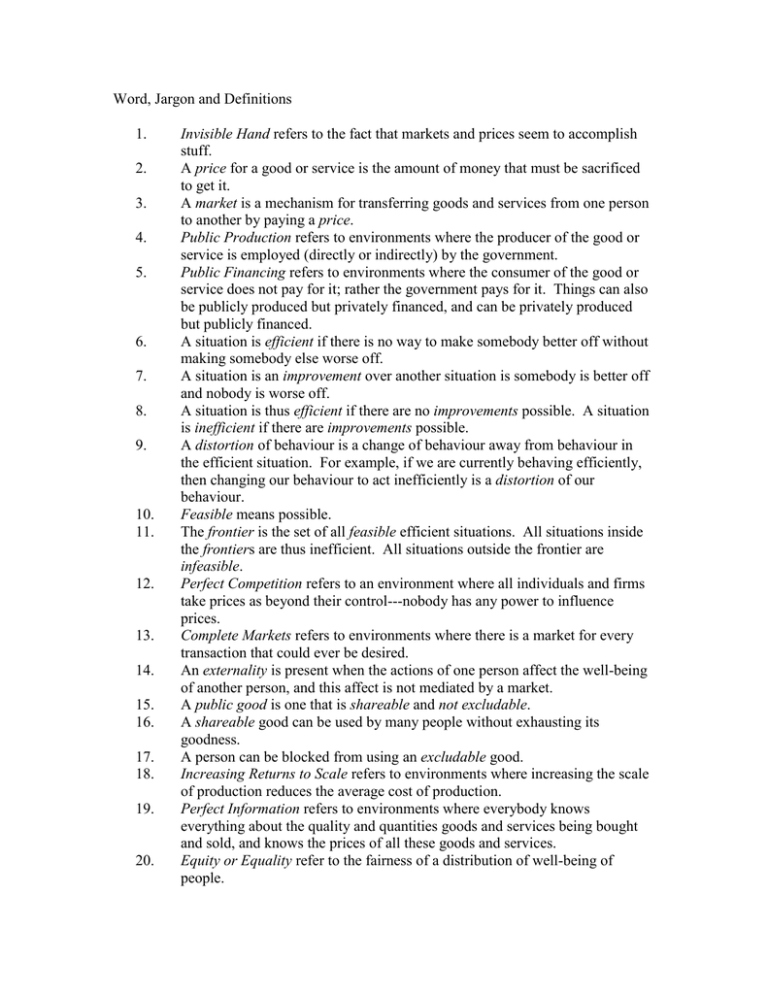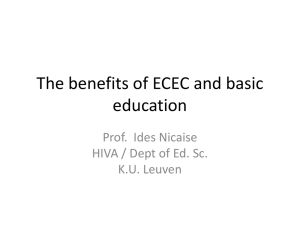Word, Jargon and Definitions 1. stuff.
advertisement

Word, Jargon and Definitions 1. 2. 3. 4. 5. 6. 7. 8. 9. 10. 11. 12. 13. 14. 15. 16. 17. 18. 19. 20. Invisible Hand refers to the fact that markets and prices seem to accomplish stuff. A price for a good or service is the amount of money that must be sacrificed to get it. A market is a mechanism for transferring goods and services from one person to another by paying a price. Public Production refers to environments where the producer of the good or service is employed (directly or indirectly) by the government. Public Financing refers to environments where the consumer of the good or service does not pay for it; rather the government pays for it. Things can also be publicly produced but privately financed, and can be privately produced but publicly financed. A situation is efficient if there is no way to make somebody better off without making somebody else worse off. A situation is an improvement over another situation is somebody is better off and nobody is worse off. A situation is thus efficient if there are no improvements possible. A situation is inefficient if there are improvements possible. A distortion of behaviour is a change of behaviour away from behaviour in the efficient situation. For example, if we are currently behaving efficiently, then changing our behaviour to act inefficiently is a distortion of our behaviour. Feasible means possible. The frontier is the set of all feasible efficient situations. All situations inside the frontiers are thus inefficient. All situations outside the frontier are infeasible. Perfect Competition refers to an environment where all individuals and firms take prices as beyond their control---nobody has any power to influence prices. Complete Markets refers to environments where there is a market for every transaction that could ever be desired. An externality is present when the actions of one person affect the well-being of another person, and this affect is not mediated by a market. A public good is one that is shareable and not excludable. A shareable good can be used by many people without exhausting its goodness. A person can be blocked from using an excludable good. Increasing Returns to Scale refers to environments where increasing the scale of production reduces the average cost of production. Perfect Information refers to environments where everybody knows everything about the quality and quantities goods and services being bought and sold, and knows the prices of all these goods and services. Equity or Equality refer to the fairness of a distribution of well-being of people. 21. 22. 23. 24. 25. 26. 27. 28. 29. 30. 31. 32. 33. 34. 35. 36. 37. 38. 39. Vertical Equity refers to how much difference there is in well-being across people. Vertical equity is about where we are on the frontier. Efficiency is simply about being on the frontier. Horizontal Equity refers to the degree to which people who are similar to each other receive similar treatment. First Fundamental Theorem of Welfare Economics states that if we have Perfect Competition, Complete Markets, No Externalities, No Public Goods, No Increasing Returns, and Perfect Information, then these complete competitive markets deliver efficiency in production and consumption, and therefore get us to the frontier. The First Fundamental Theorem does NOT guarantee that these markets deliver equity. Positive statements are descriptive, and describe how the world is. Normative statements are evaluative, and describe how the world should be. The median voter is the person who is halfway up the distribution. In majority-rule systems (with simple voter preferences), the group decision is always what the median voter wants. Progressive redistribution takes from the rich to give to the less rich (or possibly poor)—resources flows down the distribution. Regressive redistribution is the opposite, where resources flows up the distribution. Revenue is the total amount of income from all sources that a government gets. Expenditure is the total amount of spending, including spend on interest payments, incurred by a government. Deficit=expenditure-revenue. Debt=debt last year + deficit this year. Indirect Debt is debt held by publicly-owned organisations whose finances are off the government books. Assets are things owned by governments (or by people) that are valuable because they generate flows of services over time. For example, parks and bridges are government assets. Untapped oil reserves are government assets. My house is one of my assets. Wealth=Assets-Debt Cyclical deficits are those due to short-term revenue and expenditure fluctuations. Structural Deficits are those that seem to be present even when revenues are high. The Laffer Curve relates government revenue to tax rates. When tax rates are zero, revenues are zero. When tax rates are super-high, revenues are zero, because nobody works or reports their income. When tax rates are in between, revenues are positive, and somewhere in the middle, there is a maximum revenue. Arthur Laffer claimed that the USA in 1980 was on the high side of that maximum---he was famously wrong. Consumption taxes are charged on the consumption of goods and services at the point of sale. 40. 41. 42. 43. 44. 45. 46. 47. 48. 49. 50. 51. 52. 53. 54. 55. 56. Income taxes are charged on income earned, and varies with the source of the income (eg, taxes on dividend income are lower than those on labour income), and with the amount of income (because taxation is progressive). Tax brackets refer to the ranges of income that are charged different rates. Investments are things that generate a flow of services later, but which must be paid for now. Education is a type of investment, because you study now (which is costly) and earn a lot in a fun job later. Credit markets are the markets for borrowing and saving. Investment usually requires use of a credit market. Vouchers are coupons that allow students and parents to choose schools. Schools may be required to accept vouchers from all students, or not. Vouchers may be the same amount of money for all students, or not. Parents may be able to get refunds from vouchers, or not. Income-Contingent Student Loans are those which are paid back through the tax system, rather than through an arrangement with a bank, and which get repaid only during years in which income exceeds some threshold (usually, the median income). Graduate Taxes are taxes applied to people who received post-secondary training. Altruism refers to the desire of people to make other people happy, possibly their relatives and friends, possibly others. The Veil of Ignorance is a thought experiment: if you didn’t know who you were going to be in a society, what kind of society would you want to live in? Gross Domestic Product (GDP) and Gross National Product (GNP) refer to the total gross income from all sources in a geographic region (GDP), such as Canada, or for a group of people, such as citizens of Canada (GNP). The Unemployment Rate is the ratio of Unemployed people to the Labour Force. These numbers are gathered by Statistics Canada with its Labour Force Survey, which is conducted monthly by telephone to the population of civilian (that is, nonmilitary, off-reserve, not in jail) persons aged 15+. People are defined as Unemployed by the Labour Force Survey if they are not in school full-time, and did not work in the previous week, and have looked for worked during the previous 4 weeks. People are defined as in the Labour Force by the Labour Force Survey if they are not in school full-time and are either Unemployed, or if they worked at least 1 hour for money during the previous week. The Consumer Price Index (CPI) is an index of prices for goods and services. It is the weighted average of the prices for all commodities, where the weights are the shares of national expenditure on each commodity. Reported inflation is usually the proportionate change in the CPI. A recession is defined a period in which GDP has declined for 2 consecutive quarters. The Low-Income Cutoffs are a set of income levels such that if a family has income less than that threshold, we call them a low-income family. These cutoffs are often interpreted as poverty lines, and families below them are often referred to as ‘poor’. 57. 58. 59. 60. 61. 62. 63. 64. 65. 66. 67. 68. 69. The Bank of Canada is Canada’s monetary authority. They print money, manage foreign exchange transactions, manage government debt, and lend money to banks. The Central Bank Overnight Rate is the interest rate at which the Bank of Canada lends money to banks on an overnight basis. Insurance is a type of contract that specifies that you will get something if something happens, but you don’t know yet whether or not that something will happen. We use insurance to shield ourselves from risk. Risk Pooling is what insurance companies do to make it profitable to sell insurance. They pool together people with similar risks, and sell them all insurance. Each individual faces a lot of risk, but the group as a whole does not face much risk, because some individuals will be lucky, which cancels out the bad luck of other individuals. Hidden Actions are those actions which matter to insurers, but which cannot be observed by insurers. If I am insured for the risk of a broken leg, I might go skiing more. Hidden Information is that information which matters to insurers, but which cannot be credibly communicated to insurers. If I am a risk-taker, I will not tell my insurer, but they will want to know. Insurance Market Failures hinge on the twin information problems of hidden actions and hidden information. If these problems are severe enough, private insurance markets will be very expensive and bad, or may not exist. Social Insurance solves the hidden information problem by: (1) forcing everyone to buy insurance; and (2) making the insurance uniform across people. Externality Taxes are taxes applied to negative externalities, and they discourage the activity with the negative externality. Green Taxes are externality taxes applied to polluting activities. Free Rider problems refer to situations where people have incentives to deviate from good behaviour, even if they know what the good behaviour is, and where efficiency is achieved only if all people engage in good behaviour. If green taxes are not enforced, then people may free ride off the good behaviour of others in reducing polluting activities. The lack of enforcement leads to free riding, which leads to greater pollution. Failed States are those which fail to provide the needed public interventions into private markets. Clubs are non-state organisations which provide publicly produced goods and services, social insurance and/or redistribute.


